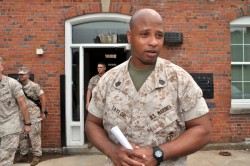National
‘Don’t Ask’ repeal a non-issue for Marines in training
Service conducts training session to prepare for open service


Gunnery Sgt. Anthony Taylor conducts 'Don't Ask' repeal training for Marines (Blade photo by Michael Key)
Uneventful.
That’s the word that might best describe the impact of “Don’t Ask, Don’t Tell” repeal on the U.S. armed forces based on briefings held this week to prepare service members for the post-repeal military.
On a warm, sunny spring day earlier this week, Marines stationed at the Marine Corps Base in Quantico, Va., take a break from their day-long training in sharpshooting and physical conditioning — which the service has practiced and perfected for its nearly 236 years of existence — to engage in something completely new: preparation to serve alongside openly gay, lesbian and bisexual troops.
Prior to start of the briefing, scheduled to begin on Monday at 1300 hours, Marines dressed in their summer camouflage gear begin settling into a briefing room at the barracks to prepare for the training. One Marine patiently awaits the training while reading the Quantico Sentry. Another Marine entering the room smacks his comrade on the shoulder with a notepad before taking a seat.
Standing in the back, this reporter — clad in a bright magenta dress shirt — wilts in the sun-baked room, which is overheated thanks to a malfunctioning air conditioner. One Marine responds, “This is nothing! Try taking a tour in Iraq!”
The start of the training is delayed for 15 minutes — unusual in the military, which almost always follows its schedules with precision — to ensure that as many Marines as possible can sign up to participate. The Marine Corps is set to finish training for “Don’t Ask, Don’t Tell” repeal by June 1.
Col. Jay Johnson, commander of the Marine Corps’ Headquarters and Service Battalion, begins the briefing by greeting his Marines with “Good afternoon,” a salutation they repeat in unison. All Marines present are part of the battalion, which comprises more than 3,200 service members and is the largest battalion in the service.
Johnson stands before his audience displaying a slide presentation with four bulletpoints: leadership, professionalism, discipline and respect. The commander has a simple message: The key to handling “Don’t Ask, Don’t Tell” repeal is for Marines to continue to treat one another respectfully.
“We don’t need anybody to remind us about that,” Johnson says. “We do that every day. We do that out of San Diego or Paris Island — the transfer over to civilian to Marine — we understand about treating each other with dignity and respect.”
Even under the change, Johnson maintains that no one will pry into the sexual orientation or relationships of Marines while they’re in the service — nor will anyone attempt to alter their personal views or religious beliefs.
“Sexual orientation — that’s personal, that’s private,” Johnson says. “Nobody’s going to get in and starting asking you about these kinds of things.”
A video plays from Marine Corps Commandant Gen. James Amos and Sgt. Maj. Carlton Kent instructing Marines on how to prepare for “Don’t Ask, Don’t Tell” repeal. When Congress considered repeal legislation last year, Amos was among those who opposed it — going so far as to say open service could prove a distraction that might cost Marines’ lives on the battlefield. But in February he issued guidance saying the Marine Corps would work to implement repeal.
“I want to be clear to all Marines, we will step out smartly to faithfully implement this new law,” Amos says. “It’s important that we value the diversity of background, culture and skills that all Marines bring to the service of our nation. As we implement repeal, I want leaders at all levels to reemphasize the importance of maintaining dignity and respect for one another throughout our force.”
The Marines watch silently as their top uniformed commander instructs them on his expectations of them during the transition to open service.
After the video is complete, Gunnery Sgt. Anthony Taylor, who’s set to handle the briefing, kicks off the training with his own words of wisdom. He’s been handling the training session since repeal implementation for two months and has already conducted four briefings.
“Like I said earlier, 235 years we’ve been doing this,” Taylor said. “The implementation of this new policy — nothing will change. As Marines, you’re first and foremost a rifleman — first and foremost. Nothing will change. I want everybody to take that away along with leadership, professionalism, dignity and respect.”
The slideshow begins detailing “Don’t Ask, Don’t Tell” repeal and that repeal states that open service will be implemented after 60 days pass following certification from the president, the defense secretary and the chair of the Joint Chiefs of Staff.
What does this mean for the Marine Corps? The female voice states that Marines are responsible for executing the change “in a manner consistent with readiness, unit cohesion while treating all Marines and sailors with dignity and respect.”
Another recorded male voice states, “Gay, lesbian or bisexual orientation in the military is no longer a disqualifying factor for entering military service. Marines and sailors are no longer subject to administrative separation on the basis of lawful homosexual conduct.”
Still, the voice states that the Marines will continue to be evaluated on their own merit in the post-repeal military and that sexual misconduct — for either gay or straight Marines — will be a violation of the rules.
“It remains the policy of the Marine Corps to evaluate all Marines on the basis of their individual merit, fitness and capability,” the voice states. “Sexual misconduct, regardless of sexual orientation, that violates that standards of rule, regulation, policy or law will still be considered grounds for administrative or legal action to include possible discharge.”
Taylor interrupts the briefing to pose a question: What happens if two Marines object to sharing a room with someone they believe to be gay and want to live elsewhere? Unlike the other military services, the Marine Corps has for decades focused on housing designed for two Marines.
“They know he’s gay, or think he’s gay, but due to the fact that he dresses a certain way — his mannerisms, the way he fluffs his hands up in the air or anything else of that nature,” Taylor says, “they request to move out of that room. Do you think that’s right, No. 1, to request to move out of that room if the only lead they can go on is that they assume that [he’s] gay? Do they have the right? And two, the company commander, does he have that moral right to make the request happen?”
A Marine in the audience stands and responds that the move may only be granted on a case-by-case basis, such as if the Marine believed to be gay has engaged in lewd activity or other actions in violation of conduct rules.
“That’s the question I was looking for,” Taylor says. “That could be classified as discrimination. Again, we’re going into a whole other avenue — possibly a [Military Equal Opportunity] complaint.”
Additional slides state that the same-sex partners of gay service members may be eligible for designation as emergency contacts or life insurance beneficiaries. Still, the Defense of Marriage Act, which prohibits federal recognition of same-sex marriage, blocks other benefits such as co-location in military housing or survivor benefits.
Taylor asks the audience if anyone has heard of DOMA. One Marine staff sergeant belts out, “It means that marriage is one man, one woman!” — perhaps the most overt anti-gay remark of the briefing.
“Exactly,” Taylor responds. “Right now, the Department of Defense recognizes that marriage is between one man and one woman, heterosexual. It does not recognize same-sex homes.”
But Taylor poses the hypothetical question: If a Marine with a same-sex partner and three children deploys to Afghanistan, can the same-sex partner receive obligations for the children?
The same Marine who answered the question about billeting responds, “Can the same-sex partner have access to the commissary or the [Post Exchange]? Yes, he can. But that’s only as long as what he’s buying is for your children.”
“You’ve been doing your reading,” Taylor says in response to the Marine.
The closing slide features a female voice restating that the main mission of the Marine Corps as a war-fighting service remains the same as it has been for nearly 236 years.
“We cannot allow these few changes to divert our focus from our warfighting mission, readiness and unit cohesion,” the voice states. “We will continue to treat all Marines with dignity and respect while demanding that all [have] exemplary behavior in keeping with our traditions and faithful service.”
Alex Nicholson, executive director of Servicemembers United, is among those observing the briefing and, afterwards, says participants may have been muted because media outlets were in the room covering the session.
“I think there might have been a number of more questions asked,” Nicholson says. “It wasn’t silent … but I think it’s just to be expected. The people in attendance are a little nervous and they’re in front of strangers. They may not feel as comfortable asking a question that may be perceived in a certain way, or that may be recorded or taken down.”
Still, Nicholson says the training presents views of gays and lesbians to a conservative audience that may not have otherwise been exposed to them.
“People from Oklahoma, Alabama and Mississippi would never have exposure to people talking about gay couples being normal and maybe having kids and living together in housing,” Nicholson says. “I think we’re going to see a … long-term benefit because it’s unprecedented. It really is showing the normal side of the gay community to a lot of people who wouldn’t normally be exposed to it.”
Following the briefing, Marines who attended say the training was helpful and that proceeding toward open service should be no problem for the Marine Corps.
Lance Cpl. Christina Monti, 22, says she was interested in all the steps the Marine Corps is taking to make sure the entire service is prepared for repeal.
“I think that it’s not going to be much of a change at all,” she says. “I think that we adapt and overcome. We don’t discriminate against anyone — race, gender, sexual orientation. So, it shouldn’t be any different.”
Sgt. Jonathan Garrigues, 27, says the briefing helped to put all Marines “at ease” during the transition to “Don’t Ask, Don’t Tell” repeal and serving alongside openly gay service members will be “not a big deal.”
“I’m a combat veteran as well,” Garrigues says. “I don’t think that it’s going to make any difference. Especially [with] the polls and everything saying homosexuals are — gays and lesbians are already serving with us, so their ability to be open [and] to be comfortable with who they are. I don’t think that’s going to be any kind of impact whatsoever.”
Capt. Stewart Coles, 27, says he thinks the briefing was “absolutely helpful” and laid out “very plainly” the Marine Corps’ plan for allowing open gay service.
“It, of course, laid out some of those basic things,” Coles says. “For instance, no matter what happens, without regard to [sexual] orientation, gender, race anything like that, it goes back to discipline and respect. Those are always the most important things.”
Asked about his personal views on serving with openly gay Marines, Coles says, “If I or any Marine had personal concerns, then, once again, that’s — orientation is a personal and private matter, just as any belief. We’re not expected to change any of our beliefs. What we’re expected to do is follow our orders and treat each other with dignity and respect.”
One remark that a Marine shouted at this reporter perhaps best sums up the ease of transition to permitting gay service members to serve openly alongside their straight counterparts.
“Hey! I have that magenta shirt at home!” the Marine says.
U.S. Supreme Court
Supreme Court to consider bans on trans athletes in school sports
27 states have passed laws limiting participation in athletics programs

The U.S. Supreme Court on Thursday agreed to hear two cases involving transgender youth challenging bans prohibiting them from participating in school sports.
In Little v. Hecox, plaintiffs represented by the ACLU, Legal Voice, and the law firm Cooley are challenging Idaho’s 2020 ban, which requires sex testing to adjudicate questions of an athlete’s eligibility.
The 9th U.S. Circuit Court of Appeals described the process in a 2023 decision halting the policy’s enforcement pending an outcome in the litigation. The “sex dispute verification process, whereby any individual can ‘dispute’ the sex of any female student athlete in the state of Idaho,” the court wrote, would “require her to undergo intrusive medical procedures to verify her sex, including gynecological exams.”
In West Virginia v. B.P.J., Lambda Legal, the ACLU, the ACLU of West Virginia, and Cooley are representing a trans middle school student challenging the Mountain State’s 2021 ban on trans athletes.
The plaintiff was participating in cross country when the law was passed, taking puberty blockers that would have significantly reduced the chances that she could have a physiological advantage over cisgender peers.
“Like any other educational program, school athletic programs should be accessible for everyone regardless of their sex or transgender status,” said Joshua Block, senior counsel for the ACLU’s LGBTQ and HIV Project. “Trans kids play sports for the same reasons their peers do — to learn perseverance, dedication, teamwork, and to simply have fun with their friends,” Block said.
He added, “Categorically excluding kids from school sports just because they are transgender will only make our schools less safe and more hurtful places for all youth. We believe the lower courts were right to block these discriminatory laws, and we will continue to defend the freedom of all kids to play.”
“Our client just wants to play sports with her friends and peers,” said Lambda Legal Senior Counsel Tara Borelli. “Everyone understands the value of participating in team athletics, for fitness, leadership, socialization, and myriad other benefits.”
Borelli continued, “The U.S. Court of Appeals for the Fourth Circuit last April issued a thoughtful and thorough ruling allowing B.P.J. to continue participating in track events. That well-reasoned decision should stand the test of time, and we stand ready to defend it.”
Shortly after taking control of both legislative chambers, Republican members of Congress tried — unsuccessfully — to pass a national ban like those now enforced in 27 states since 2020.
Federal Government
UPenn erases Lia Thomas’s records as part of settlement with White House
University agreed to ban trans women from women’s sports teams

In a settlement with the Trump-Vance administration announced on Tuesday, the University of Pennsylvania will ban transgender athletes from competing and erase swimming records set by transgender former student Lia Thomas.
The U.S. Department of Education’s Office for Civil Rights found the university in violation of Title IX, the federal rights law barring sex based discrimination in educational institutions, by “permitting males to compete in women’s intercollegiate athletics and to occupy women-only intimate facilities.”
The statement issued by University of Pennsylvania President J. Larry Jameson highlighted how the law’s interpretation was changed substantially under President Donald Trump’s second term.
“The Department of Education OCR investigated the participation of one transgender athlete on the women’s swimming team three years ago, during the 2021-2022 swim season,” he wrote. “At that time, Penn was in compliance with NCAA eligibility rules and Title IX as then interpreted.”
Jameson continued, “Penn has always followed — and continues to follow — Title IX and the applicable policy of the NCAA regarding transgender athletes. NCAA eligibility rules changed in February 2025 with Executive Orders 14168 and 14201 and Penn will continue to adhere to these new rules.”
Writing that “we acknowledge that some student-athletes were disadvantaged by these rules” in place while Thomas was allowed to compete, the university president added, “We recognize this and will apologize to those who experienced a competitive disadvantage or experienced anxiety because of the policies in effect at the time.”
“Today’s resolution agreement with UPenn is yet another example of the Trump effect in action,” Education Secretary Linda McMahon said in a statement. “Thanks to the leadership of President Trump, UPenn has agreed both to apologize for its past Title IX violations and to ensure that women’s sports are protected at the university for future generations of female athletes.”
Under former President Joe Biden, the department’s Office of Civil Rights sought to protect against anti-LGBTQ discrimination in education, bringing investigations and enforcement actions in cases where school officials might, for example, require trans students to use restrooms and facilities consistent with their birth sex or fail to respond to peer harassment over their gender identity.
Much of the legal reasoning behind the Biden-Harris administration’s positions extended from the 2020 U.S. Supreme Court case Bostock v. Clayton County, which found that sex-based discrimination includes that which is based on sexual orientation or gender identity under Title VII rules covering employment practices.
The Trump-Vance administration last week put the state of California on notice that its trans athlete policies were, or once were, in violation of Title IX, which comes amid the ongoing battle with Maine over the same issue.
New York
Two teens shot steps from Stonewall Inn after NYC Pride parade
One of the victims remains in critical condition

On Sunday night, following the annual NYC Pride March, two girls were shot in Sheridan Square, feet away from the historic Stonewall Inn.
According to an NYPD report, the two girls, aged 16 and 17, were shot around 10:15 p.m. as Pride festivities began to wind down. The 16-year-old was struck in the head and, according to police sources, is said to be in critical condition, while the 17-year-old was said to be in stable condition.
The Washington Blade confirmed with the NYPD the details from the police reports and learned no arrests had been made as of noon Monday.
The shooting took place in the Greenwich Village neighborhood of Manhattan, mere feet away from the most famous gay bar in the city — if not the world — the Stonewall Inn. Earlier that day, hundreds of thousands of people marched down Christopher Street to celebrate 55 years of LGBTQ people standing up for their rights.
In June 1969, after police raided the Stonewall Inn, members of the LGBTQ community pushed back, sparking what became known as the Stonewall riots. Over the course of two days, LGBTQ New Yorkers protested the discriminatory policing of queer spaces across the city and mobilized to speak out — and throw bottles if need be — at officers attempting to suppress their existence.
The following year, LGBTQ people returned to the Stonewall Inn and marched through the same streets where queer New Yorkers had been arrested, marking the first “Gay Pride March” in history and declaring that LGBTQ people were not going anywhere.
New York State Assemblywoman Deborah Glick, whose district includes Greenwich Village, took to social media to comment on the shooting.
“After decades of peaceful Pride celebrations — this year gun fire and two people shot near the Stonewall Inn is a reminder that gun violence is everywhere,” the lesbian lawmaker said on X. “Guns are a problem despite the NRA BS.”
-

 U.S. Supreme Court3 days ago
U.S. Supreme Court3 days agoSupreme Court to consider bans on trans athletes in school sports
-

 Out & About3 days ago
Out & About3 days agoCelebrate the Fourth of July the gay way!
-

 Virginia3 days ago
Virginia3 days agoVa. court allows conversion therapy despite law banning it
-

 Federal Government5 days ago
Federal Government5 days agoUPenn erases Lia Thomas’s records as part of settlement with White House














